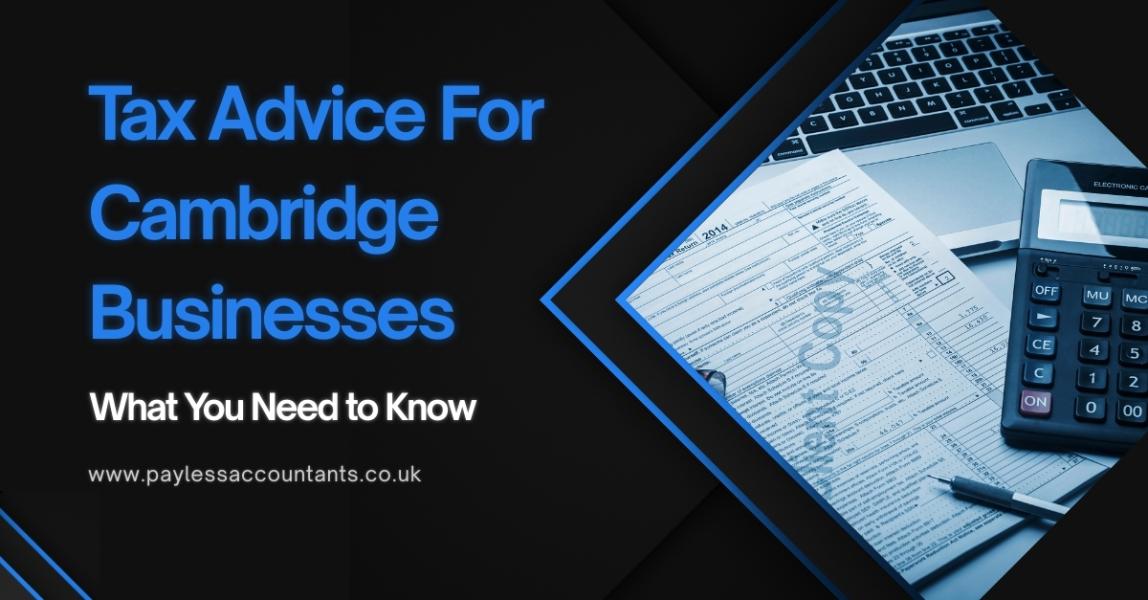Tax Advice for Cambridge Businesses: What You Need to Know
At Payless Accountants, we work with local Cambridge businesses to make tax management simpler and more efficient. Here’s what you need to know about staying on top of your taxes.
1. Understand Your Tax Obligations
Every business has different tax requirements depending on its structure, size, and industry. The key taxes most Cambridge businesses need to be aware of include:
-
Corporation Tax:
Paid by limited companies on their profits. The current rate is 25% (as of 2025) for businesses earning over £250,000 annually, while smaller businesses may qualify for a reduced rate. -
VAT (Value Added Tax):
If your business turnover exceeds £90,000, you must register for VAT and file returns quarterly. -
PAYE and National Insurance:
Employers must manage deductions for employees, including Income Tax and National Insurance Contributions (NICs). -
Business Rates:
Applicable to most commercial properties in Cambridge unless you qualify for small business rate relief.
Tip: Regularly review HMRC updates as tax rates and thresholds often change.
2. Take Advantage of Allowable Deductions
Many Cambridge businesses miss out on tax relief simply because they’re unaware of what they can claim. Some common allowable expenses include:
-
Office rent, utilities, and maintenance costs
-
Business travel and vehicle expenses
-
Marketing and advertising costs
-
Staff training and development
-
Equipment and software purchases
If you operate in a qualifying industry, you may also be eligible for Research & Development (R&D) Tax Credits, which can significantly reduce your Corporation Tax bill.
3. Plan for Self-Assessment Deadlines
If you’re a sole trader, partner, or company director, you’ll need to complete a Self-Assessment tax return annually.
Key deadlines to remember:
-
31 October 2025 – Paper tax return submission deadline
-
31 January 2026 – Online tax return and payment deadline
Missing these deadlines can result in penalties, so it’s best to prepare your documents well in advance.
4. Maintain Accurate Financial Records
Good record-keeping is the backbone of effective tax management. HMRC requires businesses to keep records of:
-
Invoices and receipts
-
Bank statements
-
Payroll information
-
VAT returns
Using cloud-based accounting software makes this process much easier and reduces the risk of errors during tax season.
5. Seek Professional Tax Advice
Tax rules are constantly changing, and what applies this year may not be relevant next year. Working with a professional accountant ensures that you:
-
Stay compliant with current tax laws
-
Identify potential tax-saving opportunities
-
Avoid costly mistakes and penalties
-
Have more time to focus on growing your business
At Payless Accountants, we specialise in providing personalised tax advice to businesses across Cambridge. Our goal is to help you streamline your tax processes and keep more of your hard-earned profits.
Conclusion
Managing taxes can feel overwhelming, but with the right planning and support, your Cambridge business can thrive. By understanding your obligations, claiming all available deductions, and staying organised, you can reduce your tax burden and focus on what matters most — running and growing your business.
If you’re unsure about your current tax strategy, now is the perfect time to seek expert guidance. A proactive approach to tax planning can make a significant difference to your bottom line.
Disclaimer
The information provided in this article is for general informational purposes only and does not constitute professional tax advice. Tax laws and regulations are subject to change. Businesses should consult a qualified accountant or tax advisor before making decisions based on the information provided here.

